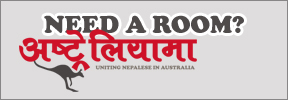BS 2081 Baishak 11
Nepal:
New to Australia?
Are you a newbie to Australia. Click here to know more about Studying in Australia, About living here, getting your first job and planning for Permanent residency.
Guide to OZ Jobs/Rooms listingsPermanent Residency for Nepalese in Australia
Australian permanent resident
An Australian permanent resident (permanent resident) is the name given to a non-citizen who is the holder of a permanent visa. A permanent resident can live, work and study without restriction in Australia.
A permanent resident has most of the rights and entitlements of a citizen, however there are differences:
- A citizen has an automatic right of entry to Australia, however if a permanent resident chooses to travel internationally, they need to ensure they have a permanent visa with a valid travel authority if they wish to return to Australia as a permanent resident.
- A citizen can vote in Australian Government elections. In most cases permanent residents cannot, however if a permanent resident was enrolled to vote (as a British subject) prior to 1984, they may remain eligible to vote.
Steps and Info to Apply for PR
The first step for most General Skilled Migration applicants is to choose which occupation to nominate and pass skills assessment in.
The criteria for skills assessment are different for each occupation, and generally rely on qualifications, work experience, English language ability, registration or a combination of all of the above.
If possible, it is best to nominate an occupation on the Skilled Occupations List (SOL). There are only 190 or so occupations on the SOL, but if you can pass skills assessment in an SOL occupation, you can potentially apply for any General Skilled visa.
Next best is to pass skills assessment in a Consolidated Sponsored Occupations List (CSOL). There are over 600 occupations on the CSOL, giving you a much wider range of occupations. However, if your occupation is not on the SOL, you will need to have sponsorship by either a State or Territory Government, or an employer.
All applicants for permanent or provisional General Skilled Migration visas must pass through the SkillSelect system. Under the SkillSelect system, applicants must first lodge an Expression of Interest (EOI), and receive an invitation from the Department of Immigration before they can make an application for their General Skilled Migration visa.
Prior to lodging an EOI, it is highly recommended that you complete skills assessment and English language testing. This is because these requirements, as well as most of the points test criteria, operate on a "time of invitation" basis. That is, your eligibility is calculated as of the date you receive your invitation to apply.
For independent and family sponsored applicants, all EOIs are ranked by points score, then by date of lodgement of the EOI. Every 2 weeks, the Department of Immigration issues invitations to the highest ranked applicants via an automated process (automated rounds).
For state nominated applicants, an invitation is issued automatically by the system as soon as the state or territory government completes the nomination.
To receive an invitation, you must meet the pass mark for the skilled migration points test (currently 60 points).
For each occupational grouping, a maximum number of invitations is set for each financial year (1 July to 30 June). Once this "Occupational Ceiling" is met, no further invitations can be issued for that financial year. In 2012-13, a number of IT and engineering disciplines hit the occupational ceiling and the signs for 2013-14 are that ceilings for these occupations will be met even faster.
Graduate Temporary (subclass 485) visas give you an extra 18 months or more to work and live in Australia after your studies.
There are two streams of Graduate Temporary Visa:
Graduate Work: an 18 month visa which requires applicants to pass skills assessment in an occupation on the SOL
Post Study Work: lasts between 2 years (for people completing a bachelor degree) to 4 years (for doctorate holders). Does not require skills assessment, but is only available only to students who applied for their first student visa on or after 5 November 2011.
Both streams require applicants to have completed a qualification taking at least 2 academic years of study in Australia and to have at least competent English (IELTS of 6 or more in all 4 components).
Whist in Australia on a graduate skilled visa, you can work full time and have study rights also.
Having a graduate skilled visa can be very handy for international students because of the following factors:
- Obtaining extra points for study, work, professional year or doing further English testing
- Better prospects of obtaining sponsorship by an employer
- Ability to move interstate to increase chances of obtaining a state nomination
- Bridging visa after completion of studies to facilitate lodgement of a GSM visa
State nominaton can be very advantageous for international students because:
- Extra points: 5 for sponsorship to live in a metropolitan area and 10 to live in a regional area
- Wider List of Occupations: students can nominate any occupation on the CSOL rather than the shorter SOL
- SkillSelect Priority: students obtain an invitation as soon as the state or territory government completes the nomination, rather than having to wait for the fortnightly automated invitation rounds
NSW greatly expanded their state nomination program in 2012-13, including a wide range of occupations, reducing the work experience and English language requirements.
Other state and territories tend to require students to have studied in the area and/or have a job offer there.
There are two GSM visas which states and territories can nominate for:
Skilled - Nominated Subclass 190: a permanent visa, allowing you to live anywhere in the state or territory
Skilled - Regional Provisional Subclass 489: a 4-year provisional visa, requiring you to live and work in a regional area for 2 years to obtain permanent residence
All GSM visas require at least competent English (6 or more in each of the 4 components of IELTS).
One of the best ways to improve your chances of qualifying for general skilled migration is to achieve a level of English higher than competent English.
If you can obtain a score of 7 or more in each component or the IELTS, or a "B Pass" in the Occupational English test, this will give you 10 points.
A score of 8 or more in each component of IELTS, or an "A Pass" in the OET will give you 20 points - with this level of English, it is difficult for an international student not to achieve a passing score in the points test.
We recommend that you undertake IELTS preparation courses. The IELTS test is not just about how well you communicate in English - understanding how the test works is also very important
Up to 20 points are available for work experience. Work experience up to 10 years old can be counted, and both work experience in Australia and overseas can be counted.
For instance, if you have worked prior to studying in Australia, your work experience might give you some points.
To be able to count work experience, it must meet the following criteria:
- Closely Related: only work experience in your occupation, or closely related skilled occupation, can be counted for points
- Post Qualification: work experience must be after completion of the relevant entry level qualification. This would generally be a bachelor degree, diploma or trade certificate depending on your occupation. Work whilst studying in Australia would not count, unless you had already completed an entry level qualification in your home country prior to studying here.
- At least 20 hours per week: only weeks where you have worked for at least 20 hours can count as skilled.
- In compliance with visa conditions: if you have breached visa conditions (eg by breaching the 40 hours per fortnight student visa condition 8105), your work experience will not count
Completing qualifications in Australia can assist greatly in meeting the pass mark. For instance:
2 Academic Years: if you complete a qualification taking at least 2 academic years of study in Australia, this will give you 5 points and open the possibility of obtaining a Graduate Temporary Visa.
Degree Level or Higher Qualification: many SOL occupations require a degree for skills assessment. Completing a degree or higher in Australia is also necessary for the Post Study Work stream of the Graduate Temporary Visa.
Professional Year: professional years are available for Accounting, Engineering and IT students. Students can complete a combination of classroom and on-the-job training after completion of their main course, generally whilst holding a Graduate Temporary visa. This provides 5 extra points, as well as an English language concession for Accounting students.
Regional Study: students completing 2 years of study in a regional campus receive 5 extra points. This also gives better access to state nomination opportunities for states and territories which require studies to be completed locally (eg Northern Territory).
Many students find employer sponsorship a good alternative to General Skilled Migration - in general there is no skills assessment requirement, a wider range of occupations (CSOL) and a lower English requirement than General Skilled Migration.
The main options are:
457 Temporary Work (Skilled): this is a 4-year visa which requires a 5 in IELTS and minimum salary of $53,900. Employers need to meet financial and training requirements to be able to sponsor
Employer Nomination Scheme (ENS): this is a permanent visa which most 457 visa holders will become eligible for after holding their 457 for two years. It is possible to apply directly for ENS providing you pass skills assessment and have at least 3 years of work experience in your occupation
Regional Skilled Migration Scheme (RSMS): this is a permanent visa requiring a job offer in a regional area of Australia. Students can in general qualify directly for this option without needing skills assessment or to first hold a 457 visa.
Many more students are using the employer sponsored options than previously, and the RSMS option is a particularly attractive one for students willing to look for work outside the major capital cities
Bridging visas can be a particularly tricky area for international students - getting this wrong can mean that you could end up being in Australia illegally.
Below are some of the most important things about bridging visas:
Lodging an Expression of Interest does not give you a bridging visa: you do not receive a bridging visa until you have received an invitation and lodge your GSM application
Most students will not have enough time to lodge a GSM application prior to expiry of their student visa: as a result, many opt to apply for either a further student visa or a Graduate Temporary visa to maintain their status in Australia whilst they prepare for their GSM application
Overseas Travel: overseas travel is possible whilst on a bridging visa. However, you will need to apply for a Bridging B visa prior to your travel. This involves payment of a fee and you will need to explain the reason for your travel.
Work Rights: students in general get full work rights on their bridging visas whilst awaiting the outcome of their GSM application.
- SkillSelect Website: updates on EOI invitation rounds
- Migration Blog: updates on changes to immigration laws
- ComLaw: migration legislation and updates
- Procedures Advice Manual: the Department of Immigration's policy manual, not publicly available
- State Migration Plans: each state and territory government produces a list of occupations in demand in their area.
- Skills Assessment Authorities: each skills assessment authority has their own criteria. We recommend that you monitor the site for your occupation to pick up any changes



